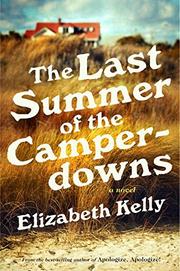

THE LAST SUMMER OF THE CAMPERDOWNS
by Elizabeth Kelly
A 13-year-old girl finds that keeping secrets can have mortal consequences in this scarifying follow-up to Apologize! Apologize! (2009).
Kelly’s new novel is just as scathingly witty as her best-selling debut but better plotted and even more emotionally harrowing, as narrator Riddle Camperdown looks back two decades to the disastrous summer of 1972. Her affluent family lives in Wellfleet on Cape Cod. Her father, Camp, a left-wing Democrat, is running for Congress. Her glamorous mother, retired film star Greer Foley, is far too self-absorbed to care much about the campaign and spends most of her time indulging in lethal witticisms indicating how tiresome she finds her husband and daughter—indeed, pretty much everything except her fascinating self. It’s in the barn of Greer’s chattering, equally narcissistic stooge, Gin, that Riddle overhears a mysterious scuffle and emerges from a stall to be menaced by sinister stable manager Gula, though he lets her flee to turn his attention to someone moaning in the tack room. The terrified girl doesn’t tell her parents, and when they hear about the disappearance of Charlie Devlin, younger son of Greer’s old flame Michael, it becomes even more impossible for Riddle to speak up, especially since Gula turns up periodically to hint at unspeakable consequences if she does. There’s bad blood between Camp and Michael, dating back to their service in World War II as well as their rivalry over Greer, who still seems oddly intimate with the man who left her at the altar. A series of revelations about Michael Devlin's eldest son Harry's true nature and Greer’s wounding breach of faith with her husband are doled out piecemeal, so the reader’s growing comprehension mirrors Riddle’s reluctant maturing. Kelly skillfully builds almost unbearable tension, slipping in plenty of dark laughs en route to a wrenching climax that leaves in its wake some painfully unresolved questions—just like life.
More fine work from a writer with a rare gift for blending wit and rue.